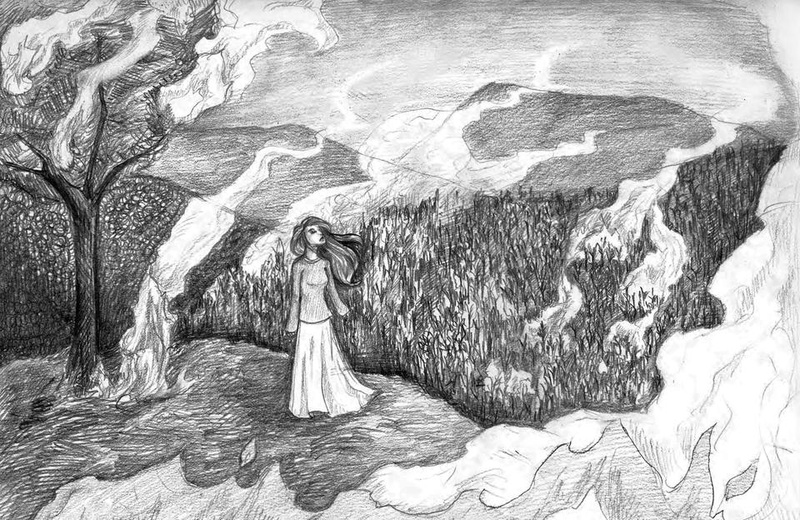With her heart thumping and mind racing, Dellarobia Turnbow embarks on an ankle-bending climb to infidelity. She is trekking up a steep Tennessee mountain road for Jimmy, the young and attractive telephone man who makes her contemplate, though not actually follow through with, an affair. He could provide a “little flint of thrill,” Dellarobia reasons, one that might even “outweigh the pillowy, suffocating aftermath of a long disgrace.” Just as she is on the verge of leaving her shotgun marriage and two young children, a supposedly divine intervention halts her sexual rendezvous: as she crests the top of the road, she observes millions of orange monarch butterflies that appear to have set the many trees ablaze. Dellarobia interprets it as a message from God and scurries back down the mountain to her family, keeping her “lake of fire” as an intimate secret in head—though not for long.
In Barbara Kingsolver’s eighth novel “Flight Behavior,” the author returns to her Appalachian comfort zone with ease, honing in on the impoverished Turnbow family of farmers and the miraculous appearance of monarch butterflies in the steep hills of fictional Feathertown. As she does in so many of her other novels, Kingsolver masterfully commands her prose in an exploration of both specific personal relationships and large societal issues. Her description of Dellarobia’s quest to redefine herself in the face of a smoking addiction and apathetic husband rings personal and touching, while a larger discussion concerning climate change, rural poverty, and the everyday struggle between ignorance and awareness subtly increases understanding about pressing issues while still allowing the reader to draw their own conclusions.
The 27-year-old Dellarobia and her husband Cub frequently struggle to make payments on time with their meager income from the profits of Cub’s family farm. When Cub and his parents, Bear and Hester, discover the same glowing trees during a logging survey, the entire family becomes the center of attention in the town, region, and country. A group of scientists arrive to conduct research on the property and tourists flock to Feathertown for a quick glimpse of the miraculous sight. It soon becomes apparent that the arrival of the butterflies signifies a shrinking habitat due to climate change, and the Turnbow family must make a difficult decision: whether to cut down the trees in order to avoid late payment on equipment loans or to not disturb the shrinking habitat.
The concerned scientists begin a conversation about rising global temperatures and altered weather patterns, which threaten the migration patterns and population of the butterflies. In a tense discussion of the logging operation, Cub insists that “there’s always someplace else to go” for the butterflies, stressing that “worries like this are not for people like us.” Kingsolver beautifully illustrates their concerns—they must put food on the table, not save the environment. But when Dellarobia poignantly responds, “What if there isn’t?” Kingsolver’s mastery of dialogue shows that the situation is dire and the consequences reverberate further than a missed loan payment for a struggling farm. Every individual must be conscious of climate change, Kingsolver frequently says, because altered weather patterns and higher temperatures do not discriminate according to socioeconomic status or any other arbitrary marker. Throughout the course of the novel, the struggles and realizations of the characters effectively emphasizes Kingsolver’s assertion that there are no legitimate excuses to ignore climate change.
As the family struggles with the decision, Dellarobia battles her low self-confidence and timidity around others. She gains some self-confidence after the research team moves into her backyard and eventually evolves from believing “her every possession was either unbreakable, or broken” to throwing an impromptu holiday party in her house. Suddenly she doesn’t care “if someone ended up with the SpongeBob glass.” As she learns to hold her own, she also becomes more aware of the dangerous implications of the butterflies’ spontaneous arrival on her property. Dellarobia’s personal change spurs important questions about the ability of Feathertown’s residents—and by extension, the rest of the country—to change. Will people become less wary of the theory of global warming, and more importantly, will they be spurred to action and change the way they interact with the land?
Though the discussion of global warming is certainly a meaningful aspect of the novel, Kingsolver’s strengths lie mostly in her narrations of everyday life, which range from intimate details of sheep shearing to serious talks about paying the mortgage. In one particular scene, Cub and Dellarobia attempt to shop for the children’s Christmas gifts amidst palpable tension. The two stroll through the aisles with $50 to spend, picking up potential items only to return them to the shelf after seeing the price tags. As they exchange passive-aggressive comments over name-brand versus generic coffee, the conversation quickly escalates into deeper jabs about personal intelligence and value systems. Kingsolver’s realistic prose allows the reader to become absorbed into the daily intricacies, patterns of speech, and deepest desires of the characters. While at times the characters’ manner of speaking can be clunky and forced, especially in the beginning of the novel, the dialogue ultimately becomes more natural and quickly immerses the reader into the rural poverty of Appalachia.
From “The Poisonwood Bible” to “The Lacuna,” Barbara Kingsolver has continually set the bar high with her work, and she does not disappoint with “Flight Behavior.” She has never failed to address larger issues alongside brilliant character development in her novels, which seamlessly connects the reader to her broader topics. Kingsolver’s exploration of the intimate and personal details of a character’s life provides an important pathway for the reader to walk away from the novel with a solid grasp of her wider message. In broaching a topic that many fiction writers have shied away from, Kingsolver does a wonderful job raising greater awareness for an important issue without overtly preaching or pushing her ideas onto her audience.
Read more in Arts
One Direction Bursts the Bubble of Former Innocence













